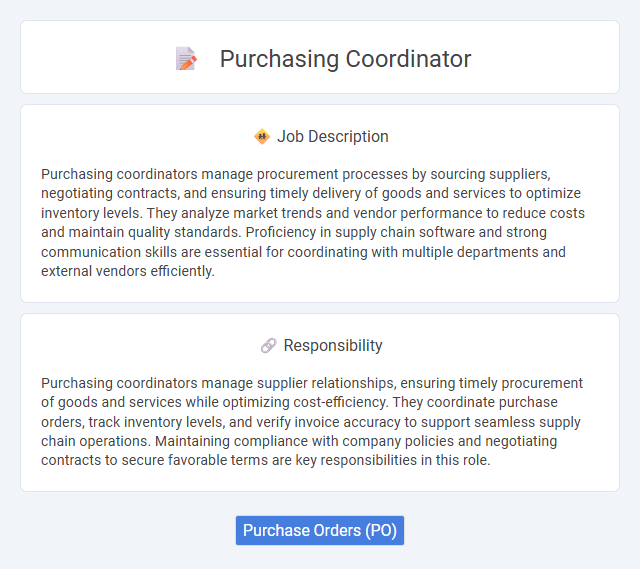
Purchasing coordinators manage procurement processes by sourcing suppliers, negotiating contracts, and ensuring timely delivery of goods and services to optimize inventory levels. They analyze market trends and vendor performance to reduce costs and maintain quality standards. Proficiency in supply chain software and strong communication skills are essential for coordinating with multiple departments and external vendors efficiently.
Individuals with strong organizational skills and attention to detail are likely to thrive in a Purchasing Coordinator role, as the job requires managing supplier relationships and coordinating orders efficiently. Candidates who enjoy multitasking and have effective communication abilities may find this position well-suited to their strengths. Those who prefer less structured environments or struggle with negotiating deadlines might find this role more challenging to perform successfully.
Qualification
A Purchasing Coordinator must possess strong organizational and communication skills, with a minimum of a bachelor's degree in supply chain management, business administration, or a related field. Proficiency in procurement software, inventory management systems, and knowledge of vendor negotiation techniques are essential qualifications. Experience in analyzing market trends, managing purchase orders, and ensuring timely delivery of goods significantly enhances job performance.
Responsibility
Purchasing coordinators manage supplier relationships, ensuring timely procurement of goods and services while optimizing cost-efficiency. They coordinate purchase orders, track inventory levels, and verify invoice accuracy to support seamless supply chain operations. Maintaining compliance with company policies and negotiating contracts to secure favorable terms are key responsibilities in this role.
Benefit
A Purchasing Coordinator likely enhances supply chain efficiency by managing supplier relationships and ensuring timely procurement of materials, which may reduce operational costs. They probably contribute to better inventory control, preventing overstock or shortages and improving cash flow management. Their role might also support strategic decision-making, leading to increased negotiation leverage and overall organizational profitability.
Challenge
A Purchasing Coordinator likely faces challenges such as managing supplier relationships while ensuring timely delivery and cost efficiency. Navigating fluctuating market prices and coordinating with multiple departments could require strong negotiation and organizational skills. The role may involve solving unexpected supply chain disruptions to maintain smooth operational flow.
Career Advancement
Purchasing coordinators play a crucial role in managing procurement processes, vendor relationships, and inventory control, which develop skills essential for higher-level roles such as procurement manager or supply chain analyst. Gaining certifications like Certified Professional in Supply Management (CPSM) and experience with ERP systems enhances career advancement opportunities in purchasing and supply chain management. Strong negotiation, data analysis, and project management abilities position purchasing coordinators for leadership roles in strategic sourcing and operations management.
Key Terms
Purchase Orders (PO)
A Purchasing Coordinator manages the creation, tracking, and reconciliation of Purchase Orders (PO) to ensure accurate procurement workflows. They coordinate with suppliers and internal departments to confirm order details, monitor delivery schedules, and resolve discrepancies in POs. Efficient handling of Purchase Orders enhances inventory control, reduces procurement costs, and maintains supply chain continuity.
 kuljobs.com
kuljobs.com